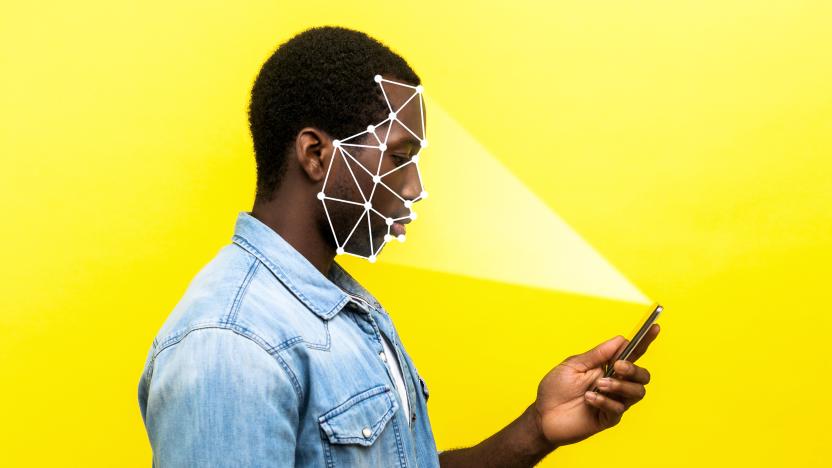emotions
Latest

Microsoft will phase out facial recognition AI that could detect emotions
Microsoft is shelving facial recognition AI it says could detect your emotions and age.

Alexa can now sound excited or disappointed
Alexa may start sounding a bit less robotic. In a bid to make Alexa interactions sound more natural, Amazon has given it the ability to respond with either an excited or a disappointed tone -- for users in the US, at least. Alexa could, say, announce that you've answered a trivia question correctly and sound like it actually means its congratulatory message. It could also sound empathetic if it's telling you that your favorite sports team has lost the game.

Brain-controlled VR lightshows could lull you to sleep
By most accounts, technology wreaks havoc on our sleep. Even tools meant to help us sleep better can make insomnia worse. But sleep and tech don't have to be mutually exclusive. Artists and researchers from Royal Melbourne Institute of Technology (RMIT) University have created a virtual reality tool to induce sleep. The device, Inter-Dream, combines ambient music controlled by artists with kaleidoscopic visuals controlled by the user's brainwaves, via EEG.

Facebook tests 'Reactions,' a Like button with more emotions
How you "like" things on Facebook is about to change. Engadget has learned that the site is about to launch a "Reactions" feature that expresses multiple emotions, instead of the long-serving, lonely "like" (and long rumoured "dislike"). Our sources advise that Facebook will start testing the feature on users in Ireland and Spain as soon as tomorrow (Friday). Update: Our sources were right, check out the official news on Facebook Reactions.

This box transmits emotions to your hand
This slightly unwieldy looking machine can apparently deliver emotions to your hand through "mid-air haptics", pinpointing areas on your palm that are attuned to certain emotions, and stimulating them. A study from the University Of Sussex used an Ultrahaptics system to communicate emotions between test groups, with the haptic group stating significantly higher stimulation compared to a test group that was only shown a picture. (Mere optical stimulation? Pssch.) Dr Marianna Obrist, Lecturer at the Department of Informatics, has apparently figured out that stimulating different areas of the hand conveys different things: hot bursts of air to the area around the thumb, index finger and middle part of the palm generate excitement, while sad feelings can be delivered by slow and moderate stimulation on the outer palm and areas around the little finger.

EmoYo shares your emotions with friends and nothing else
EmoYo is an app clearly inspired by the simplistic nature of Yo. both in name and design. Quite interestingly though, the creator is only 16 years old. The app's sole reason for existence is to add friends and share your emotions with each other easily and without any other context. It's free for the iPhone and requires iOS 7.1 or later. As with Yo, there's not very much happening in EmoYo. When you sign up, you're asked to enter your email address, plus pick a username and password. Tapping inside the password box for some reason brought up the numeric keypad rather than a full QWERTY keyboard, forcing me to restrict my password to only digits. For security purposes, the developer should address this in a future update. Congratulations, you have now signed up for EmoYo. How are you feeling? If you tap "Emotion" on the top right, you have nine different answers to that question: happy, sad, mad, excited, busy, confused, relaxed, sick or in-love. Each one carries its own color. The design of EmoYo is nice and fits in quite well with iOS 7's new design principles. However the overly thin font choice (I'm guessing some extremely light variation of Helvetica Neue) sacrifices legibility in favor of aesthetics, which is a no-no. The emotions are particularly hard to read on darker colors, and this applies throughout the app. In the early betas of iOS 7 in 2013, Apple used a light font as the system-wide default before switching to a slightly thicker Helvetica Neue for the same reason this app should. Once you choose how you're feeling, your friends in the app will see your username over that emotion's color as well as the emotion itself. If you have multiple friends they all just appear in a multi-colored list. At the bottom of that list is a Plus button to type in someone's username and add them as a friend. That's the entire app. It's a bit buggy at the moment too, but that's nothing an update can't fix. To say EmoYo is minimalistic would be an understatement. I wouldn't go as far as to say the app is crude, but it certainly has more potential. Down the road, I could see an EmoYo with built-in functionality to react to your friends' moods. For instance, if a friend is feeling sad, with one tap send a text message wishing them well. Perhaps even integration with a third-party service to send a small gift isn't out of the question. For now, the biggest challenge EmoYo faces is but one question, yet it's a question anyone who finds the app will inevitably ask: "Why do I need this?" If your friends are feeling a certain way, chances are they're already tweeting about it or texting you about it. A separate app dedicated to merely sharing emotions just isn't necessary. If this concept happens to intrigue you, EmoYo does a fine job with it so by all means, indulge. Otherwise, EmoYo feels a bit too bare bones to appeal to the masses.

Facebook explains why it briefly toyed with users' emotions
Ever since word got out that Facebook had briefly manipulated some users' News Feeds to see how their feelings changed, a number of questions have popped up: just why did the company feel compelled to experiment in the first place? How noticeable was it? And was it worth the effort? As of today, we have some answers to those riddles. Study co-author Adam Kramer explains that Facebook was worried people would stop visiting the social network if they saw too many emotional updates -- a lot of negative posts could scare some people off, while a surge of positive vibes would leave others feeling left out. That's not what happened, however, and Kramer stresses that the company "never [meant] to upset anyone."

Emotient's Google Glass app tells you how others are feeling
It's not always easy to read someone's emotions -- and that's a problem for retailers, which can't easily tell if their products intrigue you or simply confuse you. They may not have to guess for much longer, though, as Emotient has launched the private beta for a Google Glass app that identifies feelings using the device's camera. The software scans faces for emotional cues that reflect an overall sentiment, even if it's subtle; the app can tell if you're mildly pleased, for instance. Privacy shouldn't be an issue, since the app is only saving anonymous data, not images. Emotient is testing its app with just a handful of companies right now, but the finished app should help stores please customers in the future. There's also a chance you'll see the underlying technology in something you can try for yourself. The company tells The Next Web that its emotion detection will reach Intel's RealSense platform, so don't be surprised if your next webcam can tell that you're in a good mood.

Papo & Yo dev replies to fan's 'moving letter'
Let it never be said that the developers at Minority Media - the team behind Papo & Yo and a studio you should get to know - are out of touch with their fans. After receiving a handwritten, 5-page letter sent in by an anonymous fan, Community Manager Rommel Romero posted an open letter response. The text is heartwarming and thoughtful, and shows a kind of thinking it would be nice to see more of. It reads, in part: "I read your moving letter the moment it got to our studio and felt that the team would love to know about you. So, we called a meeting and I read them your gripping story out loud. I had to stop every other paragraph to regain my composure; your story is an overwhelming one and your courage is inspiring. Being a small company, our path is filled with many challenges and the energy we get from our community of fans helps us push forward. When I was finished reading your letter to the team and I looked back at them, I saw in their faces that you had given them strength." The original letter isn't posted anywhere, but it's clear that it touched on some very deep and personal issues. "In your letter, you spoke of your father and about how he tells you that your thoughts are worthless," Romero wrote. "I am writing you to tell you that we disagree: your thoughts are powerful. I will pin your letter on a board in everyone's view, so that you may constantly remind us why we do what we do."

Heartwarming Pokemon comic will make you experience all the feels
Ash Ketchum, eat your heart out; this comic about the lives of a Venusaur and the baby Charmander it adopts, all to the tune of "You Are My Sunshine," will teach you more about friendship, love and caring than that 11-year old and his electric rodent ever could. The comic comes from Tumblr blog The Very Worst Thing (some art NSFW), but we'd argue this is kind of the opposite of the worst. D'awwww.

Study finds that anger spreads further than joy on social networks
Want to get your message heard on a social network? Try raging about it. China's Beihang University has published a study of Sina Weibo users which suggests that anger-fueled online posts have more of an influence than those reflecting other emotions. During the research period, a typical bitter comment would affect posts three degrees removed from the original; joy had a muted impact, while disgust and sadness hardly got any traction. Don't be too quick to lament the human condition, though. As researchers note, many of the angry posts were triggered by politics in Weibo's native China. There's a chance that internet denizens on other social networks have a rosier outlook on life. [Image credit: Wayne Marshall, Flickr]

Intel's 3D camera technology detects emotions and eyes, gives Kinect some competition
We know that Intel sees 3D cameras as the future of computing, and the company's Anil Nanduri just provided a few hints of what that future may involve. He tells Network World that the depth-sensing technology can recognize emotions, such as happy smiles. It can also track your gaze; a camera can detect when readers are stumped by unfamiliar words in a book, for example. The technology's shape detection is accurate enough that it can even scan objects for 3D printing. We won't get a true sample of the technology's potential until Creative ships its Senz3D camera before the end of the current quarter. Nonetheless, it's already evident that Microsoft's next-generation Kinect for Windows will have some real competition on its hands.

Facebook adds new emotion selection tool, making it easier to converse
See that? That's a new feature on Facebook's status box, which has started to roll out this morning after earlier testing in January. It's also covering up a pretty depressing note from a friend underneath, who would've undoubtedly selected "sad" if he were to have recognized said feature before posting a conventional status update. For now, it appears that the emotion selection tool is only hitting select US-based users, as our European contingent has yet to see it appear on their profiles. Essentially, a smiley face has been added to the right of the photo button, and pressing it gives you a quick way to update your status -- you can share an emotion, or what you're watching / listening to / reading / drinking / eating. It seems as if Facebook wants to funnel conversations a bit; instead of only giving you free rein to blabber in a status box, it'd much rather you update with a linked artist, television show or product. That way, said entity gets included in any conversations you have, and the great revenue wheel begins to spin. At any rate, feel free to check your own page and play around with the new functionality. Then shoot us an emoticon in comments to let us know how you're feeling about it. %Gallery-185095%

The Summoner's Guidebook: Dealing with emotional stress in League of Legends
League of Legends is a frustrating game. As much as I portray myself as an unfeeling robot in the Summoner's Guidebook, I am not a paragon of precise execution and flawless decision-making. I've mentioned that I experience rage at my fellow players just as much as the next person. In fact, I probably get upset when I play more frequently than a typical player does. As many of you have probably noticed, I take League of Legends pretty seriously. I don't screw around or play oddball characters. I don't like the idea of "playing for fun," even though I like to have fun as much as the next person. Saying "I play for fun" is just an excuse to dodge responsibility for my failures, and I don't like to play that way. I like to think that my contribution in a game matters, and two to four other people are counting on me to play my best. Even though that responsibility is hard to carry sometimes, it's better to shoulder it than to mindlessly mash my face on the keyboard and expect a win. The problem is that sometimes it wears on me. I will frequently play only one game in a day if that one game ends up causing me a lot of frustration. It isn't about winning or losing; it's about dealing with the emotional frustration that comes from a game outside my control.

Samsung patent ties emotional states to virtual faces through voice, shows when we're cracking up
Voice recognition usually applies to communication only in the most utilitarian sense, whether it's to translate on the spot or to keep those hands on the wheel while sending a text message. Samsung has just been granted a US patent that would convey how we're truly feeling through visuals instead of leaving it to interpretation of audio or text. An avatar could change its eyes, mouth and other facial traits to reflect the emotional state of a speaker depending on the pronunciation: sound exasperated or brimming with joy and the consonants or vowels could lead to a furrowed brow or a smile. The technique could be weighted against direct lip syncing to keep the facial cues active in mid-speech. While the patent won't be quite as expressive as direct facial mapping if Samsung puts it to use, it could be a boon for more realistic facial behavior in video games and computer-animated movies, as well as signal whether there was any emotional subtext in that speech-to-text conversion -- try not to give away any sarcasm.

Microsoft patent application could match online moods with emotionally-targeted ads
It's a match made in marketing heaven: users let their guards down within the internet's virtual walls and ads are served up to complement their fickle mental states. At least, that's one possible version of your hyper-targeted digital future, if a patent application, filed by Microsoft back in December of 2010, is any indication. The USPTO documents outline a system wherein users' online activity would be monitored and associated with a corresponding tone, their reactions recorded and an overall emotional state affixed to that behavior. This information, once properly indexed, would then be fed into a large database containing user-identifiable emotional profiles used to deliver mood-specific ads. Clearly, this proposed endeavor all but screams privacy concerns and begs the inclusion of a giant, blinking opt-out clause. Color us paranoid, but we'd rather not see the day when our PCs know we're having a particularly gloomy Sunday.

Samsung applies for patent on emotional recognition, wants to feel out how you're feeling
Samsung might not give off the immediate impression of a warm, fuzzy company, as it really comes off more like a faceless device-manufacturing juggernaut, but that doesn't stop it trying to get a handle on what people are feeling. According to a recent patent application, the company is putting together a method of recognizing the emotions of an individual based on action units (AUs). And what exactly are those? They're components of a facial action coding system: something designed to reference the contractions of facial muscles. With a total of 30 units, several AUs combine to form a string (shown above) that's then detected by some unmentioned Samsung tech and matched to an emotion label that best fits the string. Hardware-wise, it's relatively vague -- par for the course with patent applications -- but would require a processor and memory, with no mention of a camera sensor to capture all that facial gurning. Samsung's keeping up its emotional patent armor up for now, but you can flirt with an outline of its thoughts at the source below.

ETRO robot wears its heart on its face, promises to love you
We prefer our robots stick to the household cleaning chores, a little DJing action even, and then go right back to the closet. But, when we first glimpsed this emoting automaton from Korea's Electronics and Telecommunications Research Institute, our fears of the day of robot reckoning subsided slightly. The ETRI-built robot (or ETRO for short) is currently "employed" as an ambassador for human-robot relations at Daejon's National Science Museum, treating amused passersby to outspoken professions of love backed by its LED-lit facial expressions. Originally designed as a reading robot back in 2003, version 2.0 of this humanoid helper was created with a greater cause in mind -- showcasing robotics as promising Korean growth industry. Rather than let those economic concerns muddle our whimsy, let's just focus on the AI-assisted cuteness in the video below.

Google funds project to teach computers regret, sadly won't lead to apologetic machines
We've seen a rather creepy array of robots programmed to mimic human emotions, but teaching a machine to feel regret? Now, that's a new one. With funding from Google, a team of Tel Aviv University researchers is working on an algorithm to teach computers to learn from their experiences, thus reducing instances of "virtual regret." According to the team's lead, such an algorithm would allow servers and routing systems to more efficiently deal with internet traffic, by recognizing and documenting things like sudden spikes in traffic or increased attention to an online product. Basically, the more they learn from their past inadequacies, the more effectual the machines become. Google's apparently interested in the potential impact on programs like AdSense and AdWords. Now, if they could just teach online advertisers a sense of shame... Full PR after the break.

Free for All: Is free to play turning our kids into Vegas pirates?
I think it's the hair. In fact, I know it. The constant flicking -- it drives me nuts. How in the world did wearing your hair like 60-year-old businessmen become such a fad? I've now had my groceries bagged by 16-year-old kids with eyeliner on and dual piercings in their lips. When did looking like a Vegas pirate become so popular? The flicking of their hair -- it does something to them. Justin Bieber, in a recent interview, said that he was crazy. He insisted on it. Of course, his agent wanted to push this tiny public cry for help off as some sign of genius, but we all know what Bieber meant: "This hair is *flick* driving me *flick* flat-out bonkers." What also seems to be an issue with the youngins these days is an unfiltered access to the internet. I'm not kidding -- next time you're at the mall, ask the kid with the 30 Seconds to Mars t-shirt on who the vice president is. Then ask him to spell "lose." See, on the internet and inside any number of free games, he doesn't need to know this information. After all, the only time he might be worried about "loosing" anything is when he is busy PvPing. I might be onto something. Get the hair out of your eyes, join me after the cut, and we'll discuss it further.











